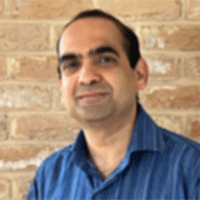
November 18, 8:00am - 8:45am
Vikram Deshpande
University of Cambridge
Presenting in Track 13: Mechanics of Solids, Structures, & Fluids
Presentation Title: New Measurement Strategies for Data-driven Mechanics
Abstract: There has been explosive growth in numerical data-driven mechanics approaches for various problems in the mechanics of materials. These data-driven methods are data-hungry, but traditional measurement protocols are inherently data-poor. Consequently, most studies using these data-driven methods have relied on synthetic data. This dearth of measurement techniques presents opportunities to transform laboratory-based methods, making them more suitable for emerging methodologies in data-driven mechanics. We first give a brief overview of some emerging laboratory techniques to provide observations that were hitherto considered nearly impossible, at least in a laboratory setting. These methods include (i) dynamic tomography to enable 3D visualisation of high-speed deformations, (ii) digital volume correlation in nominally homogeneous materials, and (ii) democratising synchrotron technologies to allow the measurements of local stresses within statically indeterminate specimens via energy-dispersive diffraction measurements.
These and other new laboratory measurement methods provide new observations and large datasets. But how can they be used in the data-driven mechanics discovery of constitutive behaviour? Broadly, the constitutive model discovery approaches fall into two categories: (i) supervised models that require data in the form of stress-strain pairs and (ii) unsupervised models that require no stress data but only full-field displacement and global force data. The energy dispersive measurements provide fully labelled stress-strain pairs for supervised constitutive model discovery approaches. Using these measurements, we shall demonstrate the learning of the plasticity models for Ti64 from a single tensile test on a simple notched specimen. Remarkably, the model indicates that simple J2 plasticity is not sufficient to accurately model the plastic response of Ti64- while this is, of course, known in the literature, those inferences were obtained using multiple different complex specimens designed with significant a priori knowledge of the material response. These new measurement techniques offer the possibility of quickly learning complex constitutive responses and may lead to the discovery of new physics.
Biography: Vikram Deshpande is a professor of Materials Engineering at the University of Cambridge. He has also served on the faculties at the University of California, Santa Barbara and at the Technical University of Eindhoven. With his students and collaborators, he has worked primarily in experimental and theoretical solid mechanics and currently serves as the editor-in-chief of the Journal of the Mechanics and Physics of Solids (JMPS). His recognitions include the 2020 Rodney Hill Prize in Solid Mechanics, the 2022 Prager Medal, the 2022 ASME Koiter medal, the 2024 Bazant medal ASCE and the 2025 European Solid Mechanics prize. He has been elected Fellow of the Royal Society, London, the UK Royal Academy of Engineering, and an International Member of the US National Academy of Engineering (NAE).